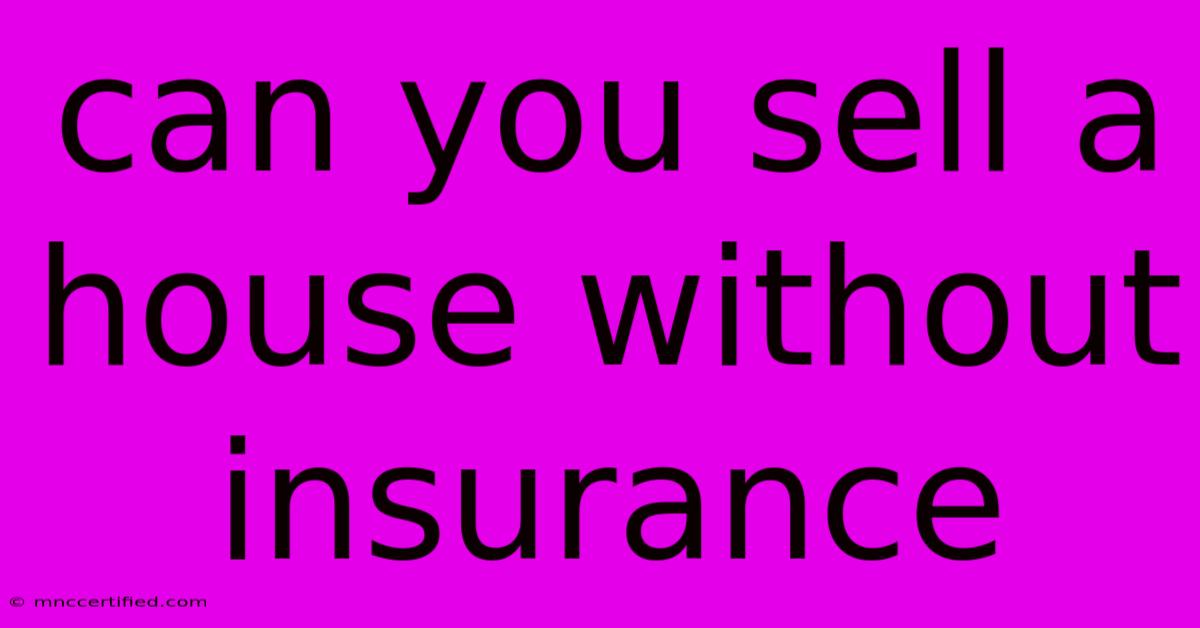Can You Sell A House Without Insurance

Table of Contents
Can You Sell a House Without Insurance?
Selling a house is a significant financial transaction, and it's essential to understand the role insurance plays in the process. While it's technically possible to sell a house without insurance, it's generally not recommended and can lead to significant risks for both the seller and the buyer.
The Importance of Home Insurance
Home insurance provides financial protection against unexpected events like:
- Fire: Protecting your home from fire damage is crucial, as it's a common cause of loss.
- Natural disasters: Flooding, earthquakes, and hurricanes can wreak havoc on homes, leaving you financially vulnerable.
- Liability: If someone is injured on your property, home insurance can help cover medical expenses and legal costs.
- Theft: Protecting your belongings from theft is essential, especially if your home is vacant during the selling process.
Risks of Selling a House Without Insurance
For the Seller:
- Financial Loss: If a disaster occurs before the sale closes, you could be responsible for costly repairs or even complete rebuilding.
- Legal Liability: You could face legal claims from buyers or others if an accident occurs on the property.
- Delayed Closing: A lack of insurance could hinder the buyer's ability to secure a mortgage, delaying the closing process.
For the Buyer:
- Hidden Risks: Buyers may be unaware of potential risks if the seller doesn't have insurance, putting their investment at risk.
- Increased Costs: The buyer might need to purchase their own insurance policy immediately after closing, adding to their overall expenses.
- Mortgage Denial: Many mortgage lenders require homeowners insurance as a condition for loan approval.
Alternative Solutions
If you find yourself in a situation where you can't afford insurance, consider these options:
- Temporary Insurance: You can obtain short-term insurance policies to cover your home during the selling process.
- Escrow Account: Agree with the buyer to hold a portion of the sale proceeds in escrow to cover potential repairs or damages.
- Disclosure: Be completely transparent with the buyer about the lack of insurance and any potential risks involved.
Bottom Line
While it's possible to sell a house without insurance, it's generally not advisable due to the significant risks involved. Home insurance provides essential protection for both sellers and buyers, safeguarding their investments and minimizing financial losses. It's always best to prioritize insurance to ensure a smooth and secure transaction for everyone involved.
Keywords: Sell house, home insurance, real estate, selling, buyer, seller, risks, financial protection, liability, mortgage, escrow, disclosure, temporary insurance.

Thank you for visiting our website wich cover about Can You Sell A House Without Insurance. We hope the information provided has been useful to you. Feel free to contact us if you have any questions or need further assistance. See you next time and dont miss to bookmark.
Featured Posts
-
Jake Paul Vs Tyson Undercard Matchups
Nov 09, 2024
-
Colorado Snow Forecast Heavy Snowfall This Weekend
Nov 09, 2024
-
Commercial Real Estate Investing Books
Nov 09, 2024
-
How To Watch Jake Paul Vs Mike Tyson Fight
Nov 09, 2024
-
How Can I Get An Mri Without Insurance
Nov 09, 2024